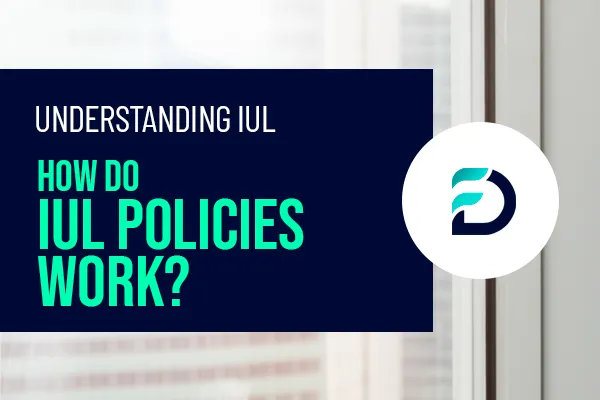Life Insurance Blogs
Life Insurance Blogs

From Concept to Reality: A Step-by-Step Breakdown of How IUL Policies Really Work

Welcome to the world of Individual Universal Life (IUL) policies! If you're curious about how IUL policies work and want to understand the ins and outs, you're in the right place. In this article, we'll demystify the workings of IUL policies in a concise and easy-to-understand manner, ensuring you have a solid grasp of this unique type of life insurance.
Understanding the Components of an IUL Policy
To understand how IUL policies work, it's important to first familiarize yourself with the components that make up these policies. Unlike traditional life insurance policies, IUL policies offer a combination of a death benefit and a cash value component that's tied to an equity index, typically the S&P 500.
The death benefit is the amount of money that is paid out to your beneficiaries upon your death. It provides financial protection for your loved ones and can be used to cover funeral expenses, pay off debts, or provide an inheritance. The cash value component, on the other hand, is a savings account that accumulates over time as you make premium payments.
The cash value component of an IUL policy is tied to an equity index, such as the S&P 500. This means that as the index performs well, your cash value has the potential to grow. However, if the index performs poorly, your cash value may not grow as much, or it may even decrease. It's important to note that IUL policies offer a minimum guaranteed interest rate, which ensures that your cash value will not decrease below a certain level, even if the index performs poorly.
Pros and Cons of IUL Policies
Like any financial product, IUL policies have their pros and cons. Let's take a closer look at some of the advantages and disadvantages of IUL policies to help you determine if they are the right fit for you.
One of the main advantages of IUL policies is the potential for lifelong coverage. Unlike term life insurance, which provides coverage for a specific period of time, IUL policies can provide coverage for your entire life as long as you continue to pay the premiums. This can be particularly beneficial if you have dependents who will rely on your financial support even after you retire.
Another advantage of IUL policies is the opportunity to accumulate cash value over time. As you make premium payments, a portion of those payments goes towards the cash value component of the policy. This cash value has the potential to grow tax-deferred, meaning you won't have to pay taxes on the growth until you withdraw the funds.
However, it's important to consider the potential downsides of IUL policies as well. One of the main disadvantages is the cost. IUL policies tend to be more expensive than term life insurance policies, especially in the early years. Additionally, the returns on the cash value component are tied to the performance of the equity index, which means there is some level of risk involved. If the index performs poorly, your cash value may not grow as much as you had hoped.
Determining if an IUL Policy is Right for You
Now that you understand the components and pros and cons of IUL policies, you may be wondering if this type of life insurance is the right choice for you. The answer to that question will depend on your individual circumstances and financial goals.
If you're looking for lifelong coverage and the potential to accumulate cash value over time, an IUL policy may be a good fit. However, it's important to carefully consider the cost of the policy and the potential risks involved. If you're comfortable with the premiums and understand the potential for fluctuating returns, an IUL policy could be a valuable addition to your financial planning strategy.
Comparing IUL Policies to Other Life Insurance Options
When considering an IUL policy, it's important to compare it to other life insurance options to ensure you're making an informed decision. Term life insurance, for example, provides coverage for a specific period of time and tends to be more affordable than IUL policies. However, it does not offer the opportunity to accumulate cash value.
Whole life insurance is another option to consider. Like IUL policies, whole life insurance provides lifelong coverage and has a cash value component. However, whole life insurance typically offers a lower potential for growth compared to IUL policies.
Ultimately, the right life insurance option for you will depend on your individual needs and goals. It's important to carefully evaluate the features and costs of each option before making a decision.
Common Misconceptions about IUL Policies
There are several common misconceptions about IUL policies that are worth addressing. One of the most common misconceptions is that IUL policies are a guaranteed investment. While IUL policies do offer a minimum guaranteed interest rate, the returns on the cash value component are tied to the performance of the equity index. This means that there is some level of risk involved, and it's important to understand and accept that risk before purchasing an IUL policy.
Another misconception is that IUL policies are only for the wealthy. While it's true that IUL policies can be more expensive than other types of life insurance, they are not exclusive to the wealthy. Many insurance companies offer IUL policies with a range of premium options to accommodate different budgets.
Tips for Choosing an IUL Policy
Choosing the right IUL policy for your needs can be a daunting task. To help you make an informed decision, here are a few tips to consider:
Research and compare multiple insurance companies: Different insurance companies offer different features and pricing options for IUL policies. Take the time to research and compare multiple companies to find the best fit for you.
Understand the policy's fees and charges: IUL policies can come with various fees and charges, such as administrative fees and cost of insurance charges. Make sure you understand these fees and how they will impact your policy's performance.
Work with a trusted financial professional: Consider seeking the guidance of a trusted financial professional who can help you navigate the complexities of IUL policies and ensure you make an informed decision.
Case Studies and Examples of IUL Policy Benefits
To further illustrate the benefits and workings of IUL policies, let's take a look at a few case studies and examples:
Case Study 1: John, a 35-year-old married individual with two young children, purchased an IUL policy to ensure financial security for his family in the event of his untimely death. The policy provided him with lifelong coverage and the potential to accumulate cash value over time. By the time John reached retirement age, the cash value had grown significantly, providing him with a valuable source of supplemental income.
Example 1: Sarah, a 45-year-old business owner, purchased an IUL policy to protect her business and provide financial security for her family. The policy allowed her to adjust the death benefit as her business grew, ensuring that her loved ones would be taken care of in the event of her death. Additionally, the cash value component of the policy provided her with a valuable source of funds to reinvest in her business.
These case studies and examples highlight the flexibility and benefits that IUL policies can offer. However, it's important to remember that each individual's situation is unique, and the results may vary.
Conclusion: Is an IUL Policy the Right Choice for You?
In conclusion, IUL policies offer a unique combination of a death benefit and a cash value component that's tied to an equity index. They provide lifelong coverage and the potential to accumulate cash value over time. However, it's important to carefully consider the costs and potential risks before purchasing an IUL policy.
When deciding if an IUL policy is the right choice for you, take into account your individual circumstances, financial goals, and risk tolerance. Additionally, compare IUL policies to other life insurance options to ensure you're making an informed decision.
Remember, choosing the right life insurance policy is an important part of your overall financial planning strategy. By understanding how IUL policies work and carefully evaluating your options, you can make a decision that provides you and your loved ones with the financial protection and peace of mind you deserve.
Get In Touch


